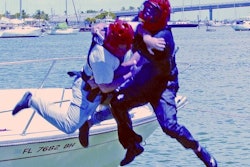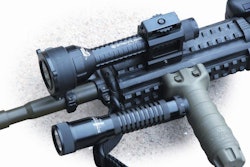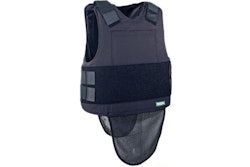Next to federally mandated training, court might be at the bottom of most cops’ popularity list. If you want to be good at it, though, it can actually be something you look forward to.
Few of us really enjoy going to court. Let’s face it, the phrase “going to court” usually includes depositions and pre-trial conferences as well as trials. Nasty defense attorneys, reluctant prosecutors, and a lot of time spent waiting—often to be told to go home and come back tomorrow—make the entire court experience one that we have learned to despise.
There is much you can’t change about court. First and foremost is that you will always have to do it, so you might as well make the best of it. The other things you can’t change are the attitudes and perspectives of others (like attorneys, judges, and juries) so simplify the whole thing and focus it on yourself.
If we can be thoroughly prepared on our cases, professional in appearance, and unshakable in our presence in a courtroom, then we’ve done our job and we can feel good about our role. The others—juries included—have to live what they did or did not do.
Professional Witness
What makes our role in court so important? As law enforcement, we are professional witnesses. More than anyone who steps up to tell the story of what happened, we are expected to do so with clarity and believability. You could be the lead in a complex homicide case or you could be a uniform officer who did one small thing, but this is for certain: All eyes are on you when you take that witness stand.
And all the eyes that really matter are those of the civilians in the jury box. They are not only making a judgment about the case you are testifying in. They are also formulating an opinion about you as a law enforcement officer and about your department. That opinion is likely to carry over to the next police witness and how the jurors might feel about him or her.
This era, like no other, is the age of TV police dramas. “CSI: Miami,” “Cold Case,” “Law and Order,” and all the others, have consistently dominated the ratings. Many citizens watch some of the fantasy that goes on during “CSI: Miami” and they believe that we all have technology like that at our fingertips. If only it were so, right?
So jurors come into their roles as triers of fact with certain predisposed ideas of what law enforcement is and what we can accomplish. Because of this, and because of the readiness of information on the Internet, it is probably much tougher now than it was 20 years ago to win a major case in court. To show today’s jurors the reality of your job, you must know your job and your case and be convincing about it.
Scene and Suspect
Court testimony starts at the crime scene. The integrity of the crime scene cannot be downplayed. Remember, it is the only aspect of the investigation that cannot be revisited in its three-dimensional form once we’ve left it. When you’re on a major scene, take steps to ensure good fundamentals of crime scene integrity.
For example, if there is a question of how much to rope off, always go for bigger rather than smaller. You can always contract, but you can’t expand. Remember, too, the textbook rules—no eating, smoking, or drinking on the scene, and no unauthorized persons.
If someone wants to go under that yellow tape, let them enter only if they have a job to do there. Curious onlookers—and we cops can be the worst—should be kept out, regardless of rank. Document every person who goes in and at what time. If possible, one entry point is best.
The word “document” is worth repeating here. Again, more is better, because you won’t get grilled for noting too much, but you will get embarrassed if you pass something over and it turns out to be of even minor importance. Don’t forget this concept: If we get sloppy or lazy and miss something, the defense will capitalize on it and make it a huge issue. The defense attorney will try to convince the jury that because of this one screw-up, we have probably neglected other things in the investigation, too.
Perhaps the most critical of court-related issues centers around dealing with suspects, their actions, their statements, and their status. This often happens early on in the investigation. Documentation of each contact with a suspect needs to be detailed, right down to the times you met and what the suspect was wearing. More important than all these things put together, however, is whether the suspect was in custody or not during the interview.
A sound understanding of Miranda is essential for every criminal investigator. Where court is concerned, your grasp of Miranda and your ability to express whether your subject was “free to leave” or not will either make you an impressive winner or a humiliated hack in the eyes of a judge or jury. If you have never testified in a “motion to suppress” hearing, you could be in for a real treat. Defense attorneys have much more leeway—since the jury is not present—and they will try to exploit whatever weaknesses, contradictions, or inconsistencies they can find to have the evidence or testimony thrown out. Again: document, document, document.[PAGEBREAK]
Pre-Game
In Florida, and probably in most states, the prosecutor calls in the lead detective or arresting officer in a case and discusses its merit prior to filing formal charges. This is an area where many inexperienced officers end up walking out of the building feeling like the prosecutor is either a) the enemy, or b) uncaring, c) stupid, or possibly all of the above. Why?
First try to see what’s happening from the other side of the table. Prosecutors hardly ever go to crime scenes or arrest scenes like we do. They don’t see the terror and despair in the victims’ faces; they haven’t experienced the agony of a next-of-kin who has just lost a loved one to a vicious murder. They’ve never risked their own necks in a chase or a fight to lock somebody up. All those ideas are foreign to them. In addition, they have a pile of case files on their desk and, especially in large jurisdictions, the idea is to “move” them, not necessarily try them. They can likewise be reluctant to try a case that doesn’t look like a sure win. We have a different attitude—we are the ones who risked our butts locking the bad guy up. Let’s give it a shot, right? Wouldn’t it be better to go to trial and lose than to never make the attempt at all?
The key to working with a prosecutor involves two important elements: One, know your case, and, two, be confident in it. Now, that’s not to say that we ourselves don’t know from time to time that we are walking in with a crappy case poisoned by shaky witnesses and skimpy evidence. Sometimes it’s all we’ve got and, again, we have the battle temperament that says, “Go for it!”
Most of the time, though, we feel pretty good about our case and we feel like it deserves a chance. So project that to the prosecutor. If you feel strongly about the fact that the guy who swung a 2x4 at you needs to spend time in prison for it, then don’t give in when the prosecutor starts to hem and haw about this sentencing guideline and that, and about how it’s his first offense, and about how the jury might identify with him because of this or that.
Stick to your guns, especially if you’re the victim. You’ve got the power there. If they still want pre-trial intervention, or worse, to nolle prosse it, then calmly ask to move the meeting to that attorney’s supervisor’s office. The preparation aspect is important here, as it is in any court-related proceeding. When the prosecutor sees that you know the times, the facts, the elements of the crime, and how they pertain to this case clearly, there’s less likelihood she’ll try to talk you out of it.
In Florida, when you are the victim in a case, the government cannot make trial decisions without consulting you first, cop or not. This is true in much of the country now, so don’t forget that when you go in for your pre-trial conference.
Depositions
Oh, how we hate the loathsome depo. Some of you lucky folks don’t have to deal with deposition. Here in Florida, we still do, and we still have to provide discovery on just about everything we contribute to the investigation. This is where the defense attorney in a big case starts licking his chops, because one of his objectives is to collect sworn statements from witnesses—like you—who have not prepared.
The deposition gets typed up and, if you’re like most cops, you never read it, though you are entitled to. You can bet your next paycheck that the defense attorney has not only read it, but has gone through it with a fine tooth comb, compared it to your report, to witness statements, to other officers’ reports, and to case evidence to try to find inconsistencies.
The defense attorney will no doubt have his copy all marked up and ready for attack at the table for trial. He’s banking on the high probability that you still haven’t sufficiently studied the deposition and that you’ll say something contrary to what you said before, which can sometimes be a year or more ago. Do yourself and the prosecution a favor by making sure to review the deposition so you don’t make any unintentional missteps during trial.
Pre-Trial Prep
Football teams practice and practice during the week, and then it is game time. Prior to the game, there’s usually a team meeting where the coach goes over the game plan to make sure everyone is on the same page. The prosecutor wants to do the same thing with pre-file conferences.
A good prosecuting attorney will try to see the case through the defense attorney’s eyes and will try to sit with you and point out where the defense will attack. You should listen well. If you’re experienced, you’ll probably already have guessed correctly what the prosecutor has highlighted in your report and in your depo.
If you’re very experienced and your prosecutor is not (this has happened on a few occasions in our office), you’ll help the prosecutor come up with a winning strategy. If there is a bona fide weakness in the case, all you can do is minimize it and try to maximize the good stuff you have.
How can you truly prepare? There is no other way to describe it other than the dreaded word “study.” That might take you five minutes, if you were an assisting officer who saw your partner retrieve a gun from under the subject’s seat and it’s a concealed weapon charge. If you are the lead investigator in a difficult homicide that took two years to close, you could be studying for hours, poring over reports and statements, calling the prosecutor with ideas, concerns, and things he might not have seen or considered. It is worth the time.
Your case file on a major case is the journal that chronicles all of your activities during the investigation. It is also a living museum of the crime that was committed. It contains copies of things you found in the victim’s wallet and address book, statements of witnesses, property receipts, and crime scene photographs. It should be “all there.”
When you walk up to the witness stand and tell your story, try to view your role as just that: a storyteller. You are describing events that you experienced, things that you observed, and the things that people told you. The court will try to prevent you from giving your “opinion.” But if carried off properly—with a confident attitude and totally prepared demeanor—your testimony should leave the jury with no doubt that you are convinced of the subject’s guilt.
Game Time
Without question, appearance has a huge impact. It might be obvious to some, but it will be repeated here: Be neat, be alert, well-rested, wear a uniform or a suit, and have a confident presence. Don’t chew gum. Don’t roll your eyes at stupid questions, even when you see the jury do it.
Be aware of use of eye contact. Use it to your advantage if at all possible. Explain your answer to the jury. They are your audience, and you are the storyteller.
Defense attorneys have a sneaky way of walking off in the opposite direction of the jury when they ask you a question, so that you are likely to be looking away from the jurors when you answer it. One tactic that doesn’t make it real obvious that you are battling the defense attorney’s strategy goes like this: Let your eyes follow her, answer the question to her, then turn your head to the jury and nod, as if to say, “you knew this all along.”
While appearance is important, what you say and how you say it greatly affect the way you and your testimony will be received.
Be clear and just loud enough to project confidence. Try not to look down while you are talking, though the defense will ask you to look at certain documents or pictures to do so. Don’t let a defense attorney get you rattled. He will see during deposition what gets under your skin and what doesn’t.
Remember, it’s all a game. Don’t take personally anything a defense counsel says. Answer politely and calmly. You might get a question like, “How many times did you ask my client if he knew where his wife was?”
The temptation is to come up with a number, to make it sound impressive. Don’t get snared into answering something like this. The best answer is, “I have no idea. I’ve never even considered counting how many times I’ve asked someone something. During an interview, I am more tuned in to what the other person is saying.” Show the jury that you are a professional and that your goal is to get to the truth.[PAGEBREAK]
Overall Strategy
Preparation plays the biggest part in your success on the witness stand. The more prepared you are, the more confident you will appear—and be—in front of a jury, and the less likely you will be to fall victim to the many trick plays the defense has up its sleeve. In major cases, usually a crime has occurred that has affected many lives. Treat it as such. Go after the conviction in court the way you would want someone to pursue the conviction of someone who had victimized a member of your family.
Meet with a couple of your more experienced prosecutors. Find out what they expect in a witness and what they hope for in a police witness. Try to get a meeting or lunch with a defense attorney and ask her how she and her colleagues like to attack a case. You would be amazed at how willing some of them are to meet with you and talk to you about what you should look out for. It’s not personal with most of them; it’s all about strategy.
As it should be with you.
Ramesh Nyberg is a 27-year police veteran in Miami-Dade County. He has spent the last 21 years of his career in Homicide. He also is a certified law enforcement instructor and teaches Homicide Investigation and Interview/Interrogation classes at his agency’s Training Bureau.
Help Yourself
While strategy for testimony is important, also be aware of the nuts and bolts preparation tactics that you should use for every case.
If you work in uniform, ask yourself these questions: Do you keep copies of all your arrest paperwork, just in case you don’t have time to get it before you go to court? Do you keep copies of your field interrogation cards and tickets? You should.
Secondly, do you take the time to go over the material before you step into an attorney’s office or a courtroom? The worst thing you can do, especially in front of a jury, is shuffle through papers, looking for answers. Invest a little time in getting up to speed on the case. You’ll look and feel like a professional later.
If you’re an investigator, this type of preparation should go without saying. In major cases, it doesn’t take but a couple of years before you have pad after pad full of notes, reports, and other stuff that you need to sift through. Start your organization process early. If you are investigating a homicide, sexual battery, or any other major case that involves a lot of witness interviews and evidence, start keeping your files on everyone and everything now. The saying goes, “the best time to consult a road map is earlier.” If you haven’t even drawn the map and it’s “later,” you’re in deep you-know-what.
Putting together a major case file takes some extra time every day. It takes labeling files, organizing them so you can find the information, and making sure that you have reports from all your support personnel, like crime scene, the medical examiner, other agencies, etc.
You might stop and ask, “Am I a cop or a file clerk?” But your diligence in putting together that case file and managing it so it is workable will pay huge dividends later. It is your first step to having the advantage in court.















